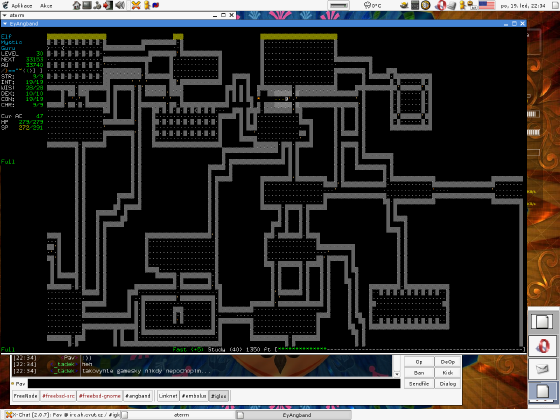

Once you very quickly realize that no seriously, ESP is incredibly important, you can go back up and put your Helmet of Telepathy back on. You can ask questions like "How necessary is ESP really?" and you can try not having ESP.

In fact, one thing I *love* about Angband is that experimentation is so much easier than in a skill-based game like Crawl. Which wand should I drop, Slow Monster or Stun Monster? Or maybe I don't need these Potion of Cure Serious Wounds because I also have a (smaller number) of Cure Critical Wounds. Which is more important, resist chaos or a little bit extra Wisdom? Is the extra damage from this sword worth losing the extra CON from that sword? I just found a Staff of *Destruction*, but my inventory is full. You almost always have to make trade-offs between different resistances and different intrinsics. He drops really good loot, and I think I can take him. You have to decide: Is there any loot worth going after? Where are the stairs? Where are monsters I can kill with minimal risk? Where are the monsters that will murder me? How do I avoid the monsters that murder me? Is this level worth staying on? Hmm, there's Saruman over there.

It comes from firing off a Staff of Magic Mapping, a rod of treasure detection and a Staff of Detect Evil (maybe not in that order), when you first descend, and then studying the map you see. I sometimes play others (TOME, ADOM, and Frogcomposband), but Angband is consistently the one I come back to, the one I enjoy the most and annoys me the least (in fact, it doesn't annoy me at all).Īngband's depth doesn't come from the combat or spell selection or character building. So Angband is hands down my favorite Roguelike. On the flip side, you can die in one-turn in Angband if you aren't prepared or have REALLY bad luck, and then all that progress is lost. But it feels like you can prepare for the RNG, where in Brogue or DCSS it feels like a bad run can screw you. Angband is long and you do better by being super careful. I think that's why people prefer Brogue or DCSS. This took me ages to get used to, because I liked to smash smash smash, but I did a lot better when I just started leaving levels if something bad happened. Knowing what monsters are DANGEROUS and leaving levels when they turn up. I used to hate it, because it seemed tedious, but now I always carry a detect items staff/rod/scrolls around because then on a new level I can just beeline straight to the good stuff.Ī lot of Angband is about playing the metagame rather than dealing with problems in the game. Levels helps, but there's also getting stat potions to max your stats when they start to turn up, and covering all your major resistances before dragons become a thing. If it's gameplay related, then a lot of the game is about knowing what you need to venture further. Turning on a bunch of visualisation options helps too with being able to get more clarity out of the game.
Angband oook windows#
If you are playing the windows version, you can set the console up with a lot of sub-windows, so you don't have to keep checking them on the main screen. I love playing mage, so I bound the number keys to my most commonly used spells, to make it less tedious. Saying that, it depends on where you keep getting stuck. You can grind on a particular level until you have what you need to descend. You get further by having good knowledge of the game, as you do in most roguelikes, but the RNG aspect is more in your control as you can leave a hard level and clean out an easier level. Generally Angband is less like other roguelikes where you have a limited map and you are attempting to achieve a specific goal in a certain time.Īngband feels more like an MMORPG in the sense that you control how deep you go, and where you think it's safe to adventure. Tl dr: play the game to learn what you need to survive, and then each new run focus on getting that!


 0 kommentar(er)
0 kommentar(er)
